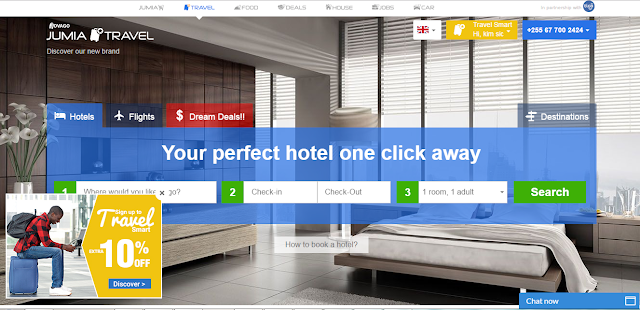How internet impacts growth of tourism in Africa
By Jumia Travel Tanzania
Africa is the world’s second most populous continent with approximately 1.2 billion people (41% urban) and is expected to reach 2.5 billion in 2050 which is the same to 25% of the world’s population.
The 2017 Hospitality Report in Africa presented by Jumia Travel revealed that one out of three Africans belongs to the middle class and are expected to double by 2050. This group plays an important role as contributors to local and regional tourism.
Currently, factors which contribute to the tourism sector across the region is the rapid growth of internet usage among Africans.
According to the report, the internet users in Africa are more than 300 million, representing a penetration rate of 27%. And to some greater extent the statistics indicate that most of them use through mobile phones.
The report explains further that by end of 2015, 46% of the African population (more than half a billion people) subscribed to mobile services. The number of unique subscribers is estimated to reach 725 million by 2020. And that has been facilitated much by the extension of the 4G network to more than half of the African countries, with 72 live LTE (Long-Term Evolution) networks in 32 countries by mid-2016.
Due to the development in internet usage, tourism sector specifically hotel and accommodation services have been impacted in a positive way. Now the internet has enabled travelers to browse everything they are looking for in hotels online instead of paying physical visits.
Jumia Travel’s report unveiled that travelers now prefer to use online platform as it is safe, quick and more reliable. It shows that most of them prefer smartphones (51%) rather than computers (49%) to search for hotels online. Apart from that, even the booking method to greater percentage is also done via smartphones (68%) compared to computers (32%).
Those statistics shows a good sign that eventually Africans have started to embrace positively the usage of internet in their daily lives. Therefore, in one way or another it is a waking up call for tourism and hospitality stakeholders to take the internet more seriously especially by shifting or focus on online platforms.
However, Africans are still far behind in the internet usage compared to the rest of the world but the situation has changed in some different aspects. For example, by online hotel booking services being established in the industry, travelers can now search and book for a room regardless of the distance or timing they are.
Through the internet, a traveler instead of calling or visiting the reservation desk at a hotel can now view a list of hotels, their locations, rooms’ prices, rooms’ availability and even pay instantly. Hence, within a short time traveler cannot imagine how time and money could have been saved.
The internet has not only been useful to travelers but also hotel and reservation managers. Currently, there are systems designed to easy operations of the hotels such as Jumia Travel’s Extranet. With such a system accessed in either a computer, tablet or smartphone, a hotel managers can regulate and monitor all the hotel’s activities wherever and whenever they are.
Apart from that, the system enables them to update the rates, rooms’ availability, accepting bookings online, be aware of the number, type and preferences of their customers as well as viewing reviews from the customers so as to improve their services and stay competitive.
Lastly but not least, the report has also identified the top eight African countries with greater internet penetration are such as follows; Kenya (74%), Mauritius (63%), Seychelles (57.6%), Morocco (57.3%), Nigeria (52%), South Africa (51.6%), Tunisia (50.5%), and Cape Verde (44.1%).

Comments
Post a Comment